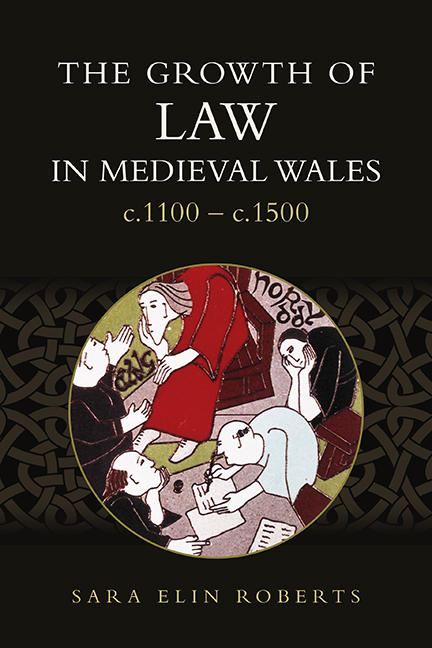1 - Introduction: Medieval Welsh Law and the Lawtexts
Published online by Cambridge University Press: 08 October 2022
Summary
Several academic disciplines benefit from the rich and extensive corpus of lawtexts of medieval Wales. Manuscripts of Welsh law occur among the earliest Welsh manuscripts, dating from the mid-thirteenth century. The lengthy prose texts of Welsh law are important sources for the study of the Middle Welsh language. The manuscripts themselves are important evidence for the field of medieval Welsh codicology, and the scripts and their scribes illuminate the development of medieval Welsh palaeography. The law contained within these books is crucial for legal historians and legal scholars, and historians refer to the legal texts as a source on medieval society, politics and intellectual thought. The study of the medieval Welsh lawtexts is central to many aspects of studies on medieval Wales.
Despite its importance, the field of medieval Welsh law has however suffered somewhat from an image problem, and detailed study of the texts is confined to a small group of specialists. A highly accomplished scholar once joked to me that Seminar Cyfraith Hywel, the academic group focusing on the study of the Welsh lawtexts, was like a secret society that spoke in code, with the inner circle referring to ‘Q’ and ‘J’, which outsiders could not follow. Another academic with an expertise in the extremely complex twelfth- and thirteenth-century Gogynfeirdd praise poetry described the field of Welsh law as ‘very difficult’. While it is pleasing to imagine that my own subject area is the rocket science of medieval Wales, the reality is that the topic itself is straightforward. This may not necessarily seem to be the case for a scholar whose expertise is in Middle Welsh narrative prose or poetry, as they confront a different situation: unlike Welsh law, those areas of study do not tend to have to deal with numerous manuscripts with many significant differences in the texts, but this is a matter of acquiring familiarity with a certain working procedure. Getting to the actual material is trickier, requiring a study of the manuscripts and texts and their relationships to each other. The aim of this chapter is to provide such an overview, offering a brief history and context for the Welsh laws in general, and then discussing the different manuscripts and texts, thus setting the scene for the textual studies that follow.
- Type
- Chapter
- Information
- The Growth of Law in Medieval Wales, c.1100-c.1500 , pp. 3 - 22Publisher: Boydell & BrewerPrint publication year: 2022



